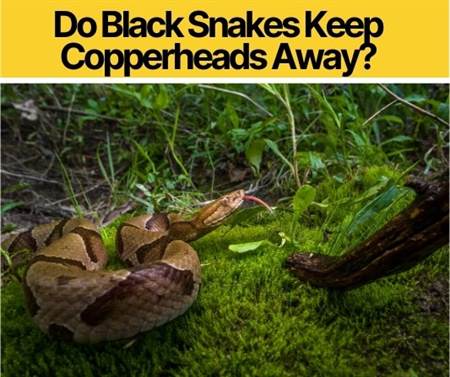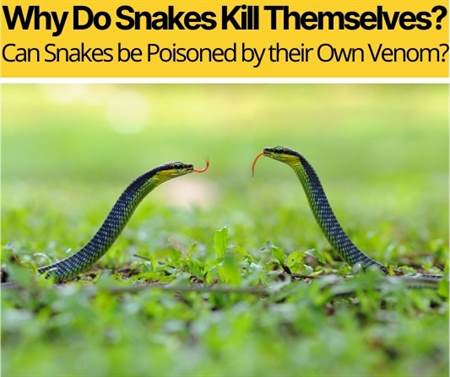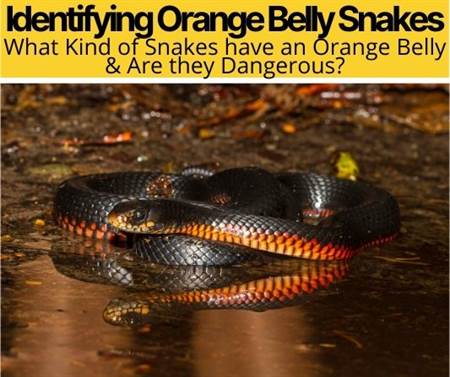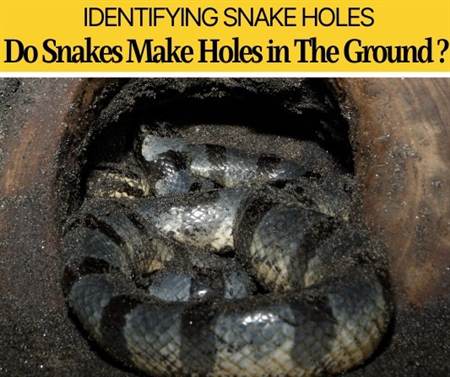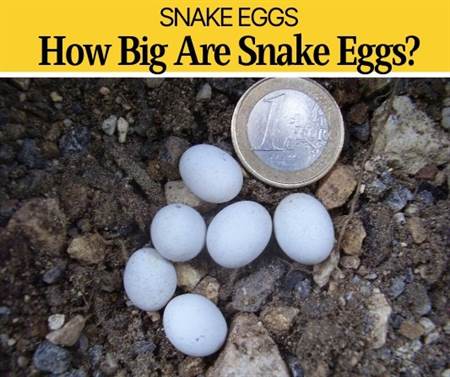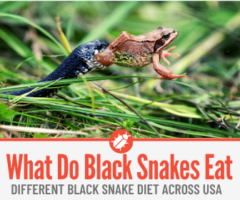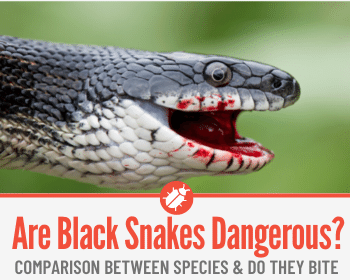 Wondering if a Black snake you may have seen in your yard is Dangerous? Are Black Snakes Poisonous or are known to bite people?
Wondering if a Black snake you may have seen in your yard is Dangerous? Are Black Snakes Poisonous or are known to bite people?
In this guide you will learn:
- Which Black Snakes are Dangerous and Venomous,
- Specially In-depth about the Common Black Rat Snakes bites,
- Can Black Snakes be dangerous to your Pets,
- What to do if you get bitten by a black snake.
There are different types of Black Snakes, this article is going to cover all of them and show you pictures of how they look like – but especially Focus on the Black Rat snake as it’s the most common black snake found in North America.
Are Black Snakes Dangerous?
Some Black Snakes such as Black Rattlesnakes, Black Moccasins or Black Mambas are poisonous and can be very dangerous.
Other Black Snakes Such as Black Rat Snakes, Black Racers ,Black kingsnakes , Black Swamp Snakes , Black Ring Necked Snakes , Black Mud Snakes are not poisonous and not dangerous to humans.
It’s important to note, while the most common Black Snakes found in North America are not venomous, all black snakes can bite as self-defence or if you step on them.
Snake bites, even from non Venomous black snakes can still be dangerous as they will hurt a lot and can cause serious infections.
Black Rat Snakes
The black rat snake, also known as the Eastern rat snake, “pilot snake” or “chicken snake” is a conspicuous black snake that receives more frightening reactions than it deserves!
The black rat snake can first be identified by its particularly large size. Black Rat Snakes are typically three and a half to seven feet long fully grown, but these snakes can grow past eight feet long in some cases!
As the name suggests, this black snake is mostly all black, but its throat has a noticeably lighter shade of creamy white or yellowish hue.
The lighter colors on this black snake distinguish it from other look-alike snakes, as the contrast is noticeable.
Black Rat snakes back keeled scales are shiny and distinct. Their body is often girthy, but they have a fairly small head indistinct from their body.
Black Rat snakes are found all around North America as they tolerate many different types of habitats.
Black rat snakes seem to prefer higher altitudes compared to other rat snakes, though.
Read on to discover more about this misunderstood North American Black snake species.
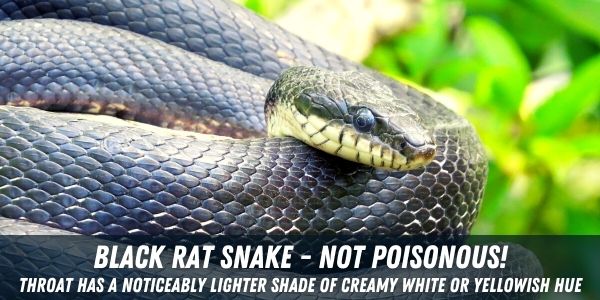
Are Black Rat Snakes Poisonous?
Black rat snakes are non-venomous snakes, and they’re nothing to be frightened of.
Black Rat snakes are easy to mistake for a rattlesnake, as they will sometimes shake their tail when they feel threatened, releasing a rattling sound. These black snakes are sometimes mistaken for a copperhead snake.
Rest assured, the black rat snake is neither of those venomous serpentine dangers, and it cannot poison you.
Like most snakes, when threatened, black rat snakes emit a foul smell. The black rat snake’s odor specifically smells how a poison might, in hopes that this defence mechanism wards off its predators.
Do Black Rat Snakes Bite?
Black rat snakes are diurnal, meaning they live their lives in the daytime. However, if you encounter one, there’s a chance you won’t even notice it.
The Black Rat snake can use its dark black coloring to blend in with forest floors or nearby surroundings, staying very still. Black rat snakes can also climb up trees, and they could lurk in one without your knowledge.
The black rat snake is most likely to hold still when it feels threatened. It might also scurry away quickly at the sense of danger.
That being said, if a black rat snake feels threatened enough, or is being mistreated, it will bite you.
However, black rat snakes won’t seek out to do so.
Does a Black Rat Snake Bite Hurt
Black rat snakes are non-aggressive unprovoked, and they aren’t venomous either, but if you ever do find yourself in the grip of their bite, it will hurt!
Black rat snakes aren’t heavy, but they are rather large, and this only makes the bite more painful.
When black rat snakes do bite, the bite mark may look more like a human’s teeth marks, since black rat snakes don’t have traditional fangs.
However, black rat snakes are calm, non-threatening animals that will respect your space if you respect theirs.
Are Black Rat Snakes Dangerous To Humans
Black rat snakes will never cause trouble to a human that is not causing harm to them.
Black rat snakes are easily handled by humans, and sometimes they’re even kept as housepets.
It is not uncommon to spot a black rat snake in some regions of North America because they inhabit suburbs, residents, and homes frequently.
In this case, once you identify it as a black rat snake you can be at ease that this is not a dangerous snake.
Are Black Rat Snakes Dangerous To Dogs or Cats?
Black rat snakes are carnivorous. They hunt and kill by striking their prey with an open mouth, clamping down, and then restricting the prey’s body until it’s no longer breathing.
Thankfully, black rat snakes aren’t interested in performing this hunting ritual on dogs or cats!
They would find them too hard to digest.
Black rat snakes mostly eat rodents, but they also enjoy fish, birds, eggs, insects, lizards and even chickens.
Continue Reading: What Do Black Snakes Eat
Black Snake Teeth/Fangs
Black rat snakes do not have fangs but instead possess small teeth.
These Black Snakes don’t have the recognizeable two fangs that venemous snakes do since black rat snakes are non-venemous.
They do, however, have very sharp teeth! Their back teeth are curved, adding to the puncture of their bite.
But being bitten by a black rat snake is not a concern. Even if one bites you, it may not even break your skin.
Remember that these mild-mannered black snakes probably won’t bite you in the first place. They prefer to be left alone.
Black Racer Snakes
Black racer snakes are non-venomous black snakes and thus not poisonous. They’re found in North America, specifically throughout Florida.
Black Racer Snakes have tiny bodies and a length of at least twenty inches, and no more than over fifty inches long.
Although black racers may look all black, they may also have a bluish tint to their body containing white markings along the throat area.
Their underbelly coloring can appear grey. Younger black racer snakes are fully grey with distinct brown spots running along the body that appear to be outlined in black.
The longest black racer snake was seventy-two inches long!
Are Black Racer Snakes Dangerous?
The black racer snake is not venomous, nor are they dangerous creatures to humans or pets. It’s a mostly non-aggressive snake that won’t display threatening behavior unless provoked fully.
Black Racer snakes will be very unlikely to attempt to bite you unless it is being harmed or directly.
In this case, they may bite, but Black Racers are not poisonous snakes and do not need to be feared.
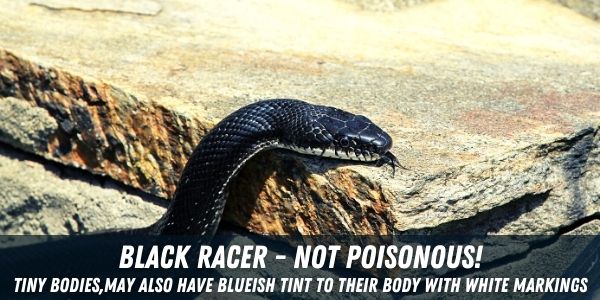
Black Kingsnakes
Although, black kingsnakes are known to bite, their bite is not venomous to humans. Sometimes referred to as Eastern Kingsnakes, this snake is often found in eastern North America.
Black Kingsnakes are a shiny, stark black color with whitish or yellowish coloring in a scaly or chainlike pattern on their underbelly. Though some look all-black, some also have whitish or yellow horizontal markings all along their body.
They have a stocky build, though their head is non-distinct from the body. Usually, they are no more than four feet long, although the longest recorded black kingsnake was fifty-eight inches long.
Are Black Kingsnakes Dangerous?
The Black Kingsnake has an intimidating name that refers to its hunting of other snakes, even venomous ones.
Other snakes, poisonous and non-poisonous, are its main diet.
Black Kingsnakes will also eat birds, eggs, rodents, and lizards. Yet, for humans, black king snakes pose no threat and they are not dangerous,
That’s not to say Black Kingsnakes won’t bite you – because they will!
They may produce a rattling sound with their tail as a warning, but fortunatly Black Kingsnakes bite is not poisonous.
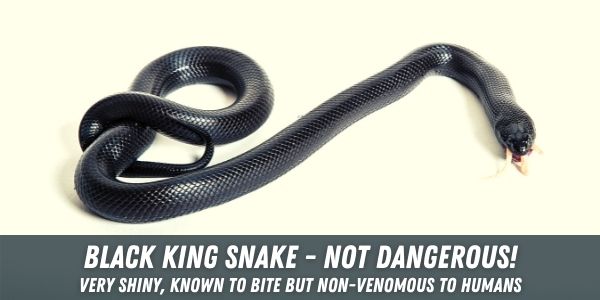
Black Mamba Snakes
Native to Southern and Eastern Africa, the black mamba snake doesn’t look black at all! Instead, they’re a creamy grey color, sometimes described as having brown or olive coloring.
It’s for the menacing blue-black color inside their mouths that they were named, which they’ll show you if they are ready to bite – and their mouths are certainly to be feared.
The black mamba snake is easily recognized as one of the most dangerous snakes in Africa.
They have a light underbelly and cobra-like head that give them away. Their body, for a snake, is the longest in Africa, and reaching up to fourteen feet in some cases.
Are Black Mamba Snakes Dangerous?
Yes, Black Mamba snakes are Very Dangerous.
Beware this snake’s lethal bite! The black mamba snake is well-known in African culture for its fatally venomous bite.
The snake’s personality makes it just as fearsome, acting in quick, nervous movements, especially when provoked. Racing up to twelve miles per hour, black Mamba Snakes are extremely fast snakes and can be expected to attack if sparked off.
Provoked, it’s a violent snake that will bite, not once, but multiple times when it has decided to kill. Black Mamba Snake’s highly potent and toxic venom has killed humans on occasion.
It’s important to note that this Black snake will likely not attack if unprovoked, as it doesn’t want to cause trouble.
It may act shy and use its quickness to get away. If you see this Black snake, you’re wise to do the same!
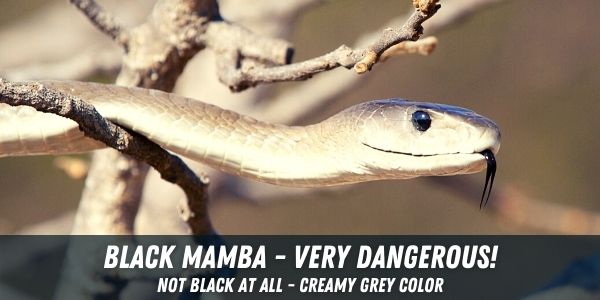
Black Swamp Snakes
This black snake is an aquatic, non-venomous snake. Black Swamp snake has a smooth, shiny black coloring on its back, and a vibrant orange-red coloring runs down their underbelly.
Black Swamp snakes are small, no more than two feet long. They are sometimes misidentified as small mud snakes.
These black snakes are found throughout Florida and along the peninsula, but they are not known for being in the Florida keys.
For this, they are sometimes known as the North Florida swamp snake.
Are Black Swamp Snakes Dangerous?
Black Swamp snakes are very non-threatening snakes that is rarely seen. Even when black swamp snakes are captured, very seldom will they bite.
Black swamp snakes may be more inclined to try to get away. Even if these small creatures do bite you, they’re nothing to be considered dangerous, since black swamp snakes are non-venomous.
Even their diet is fairly simple and non-threatening, including fish, worms, frogs, and salamanders.
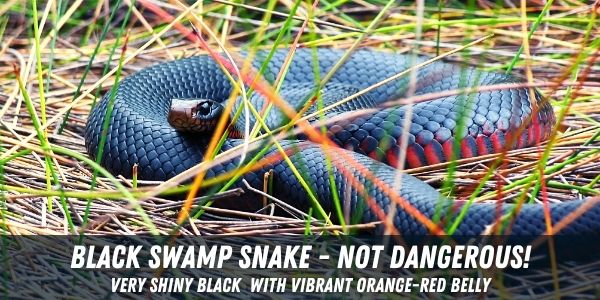
Black Ring-Necked Snakes
These black snakes are named for the vibrant yellow-orange band gracing their throat. This same color runs along their underbelly, often with black spots or “half-moon” shapes lining their bottom side all along down the center from head to tail.
The warm colors on Black Ring-Necked Snake’s body can range from yellow to orange, to red in tone. Particularly in the southern regions of its habitat, the ring that surrounds Black Ring-neck snake’s throat area is sometimes incomplete, or in some cases, non-existent.
Black Ring-neck snakes are very petite snakes, with a size ranging from eight to fourteen inches long. Sometimes they grow to be slightly longer, but they never exceed two feet long.
Are Black Ring-Necked Snakes Dangerous?
The temperament of the black ring-necked snake is comparable to their stature. Black Ring-Necked Snakes are non-threatening, non-venomous snakes that will release their foul smell or portray frightened behavior if they feel threatened.
Black Ring-neck snake is not a snake that you would expect to bite you. When they feel threatened, they may curl up in defense to show you their colored underbelly as a bluff-tactic.
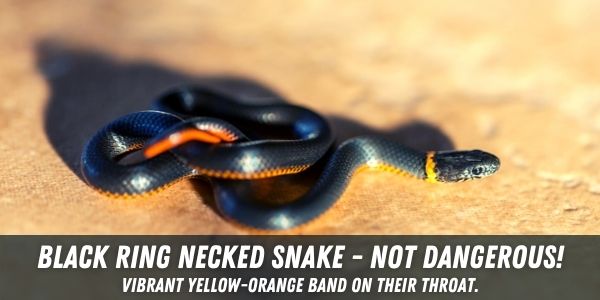
Black Mud Snakes
The black mud snake, or red-bellied mud snake, is a non-poisonous snake. These snakes can be three and a half to almost seven feet long and they look more threatening than they are.
They are especially aquatic and secretive snakes with thick, heavier bodies. Black Mud snake’s coloring is shiny black on their back side and their red bellies differ in pattern and variation.
Usually, the red coloring shows up in horizontal bands that can extend up to their sides, sometimes being visible when the snake is lying flat.
The color and thickness of the red bands vary from orange-red to pink, and from distinct, uniform bands to blotchier shapes.
Necks and head areas on black mud snakes can also vary in coloration and sometimes show yellow blotches. Black Mud Snakes have thick, indistinct necks and red pupils.
Are Black Mud Snakes Dangerous?
Black Mud Snakes are non-venomous and non-aggressive, and therefore not threatening to humans or pets. They release a foul smell like all snakes when threatened, but Black Mud snake will not bite.
Black Mud Snake will rather attempt to retreat when they feel threatened, or they may use a bluff-tactic of charging their head, mouth closed, at the threat.
Black Mud snakes may also coil themselves around your arm, and they press their tail firmly against their perceived threat, but all of these are harmless moves.
They are much more fearful of humans than we need be of them.
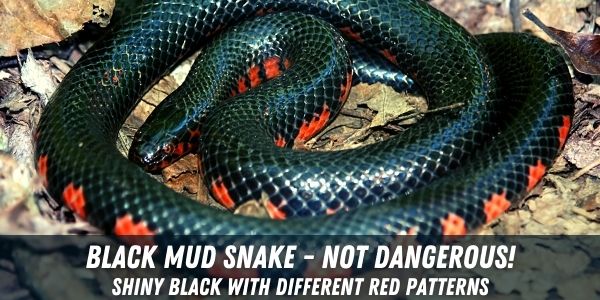
Black Pine Snakes
The Black Pine snake is protected, as it is listed as a threatened or endangered species. Black Pine Snakes are non-poisonous, but they are constrictor snakes.
Black Pine snakes have a thicker body with a small tail and a slightly larger head than their neck. Occasionally their coloring will be accompanied by a faint white pattern, but for the most part, black pine snakes are all-black, with an extremely shiny quality to their skin.
Found in North America, in the Southern and Eastern American states, black pine snake possess a turned-up snout and lighter underbelly to complete their description.
Black Pine Snakes are the second-largest snakes in Northeastern America, and they can grow over eight feet long.
Are Black Pine Snakes Snakes Dangerous?
Black Pine Snakes are not necessarily dangerous, and they can even sometimes live under human care. However, it’s wise to be cautious when handling this constrictor.
Although black pine snake’s bite is not venomous, they will still use it as a defence, and this can be quite painful. It’s not uncommon for black pine snake bites to withdraw blood or cause a snake tooth to be caught under the skin.
Again, although not immediately dangerous, black Pine snakes are to be handled carefully.
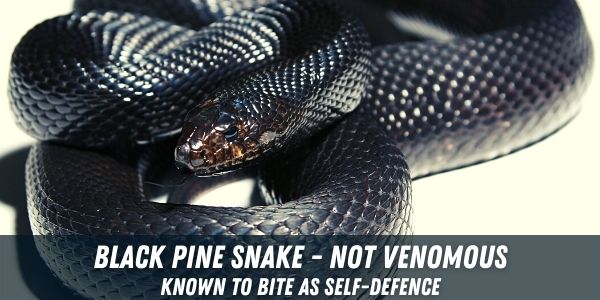
What Happens and What to do If You Get Bitten by a Black Snake
If you happen to be bitten by a black snake, it’s important to first keep calm and ask yourself these questions:
- Was the bite done by a non-venomous black snake?
- Have you had a tetanus shot within the last ten years?
- Can you still feel and move the affected area?
- Is the affected area not too dirtied by soil, or any other substance – is it fairly clean beside the black snake’s bite?
If you answered yes to all of these questions, then you have no cause for immediate worry.
You may visit a doctor the next day for a professional opinion, or take yourself or the snakebite victim to urgent care if the inflicted area is particularly painful to endure on its own.
However, if you are bitten by a non-venomous snake, like most of the snakes listed above, you can skip the ER visit unless you are concerned about tetanus, infection from other external dirtiness, or intense bleeding or pain.
Steps you can take after being bitten by a non-venomous black snake:
- Wash the affected area and make sure it’s completely clean.
- Apply antibiotic ointment if you believe it will help.
- Ask yourself if you’ve received a tetanus shot in the last 10 years.
- Check to see that you can still feel and move the bitten area.
- Watch the affected area for a few days to ensure it’s begun to heal.
Lastly, the majority of black snakes listed here are non-venomous, even the black rat snake. Make sure you check which ones, so you can be sure whether or not you’re safe in case you encounter or are bitten by one of these species.
On the other hand, if you have fallen victim to a venomous black snake, like the black mamba snake, you should seek immediate medical treatment, as this is a poisonous bite that could end your life.
Upon getting medical attention, you’ll recieve antivenom to strengthen the immune system and you may experience serum sickness, though this condition is not fatal.
Moving forward, the doctor will ensure that the black snakes bitten area is clean, and they’ll continue to monitor the bite. In extremely rare cases, surgery may be necessary.
Conclusion
Myths and legends surrounding black snakes and their venomous dangers have been circulating humankind for many years. Still, it’s important to remember that not all black snakes are venomous or dangerous.
It’s wise to know which black snakes to avoid and which black snakes are harmless. Being informed about Black snake encounters is truly the best way to be prepared for one.

